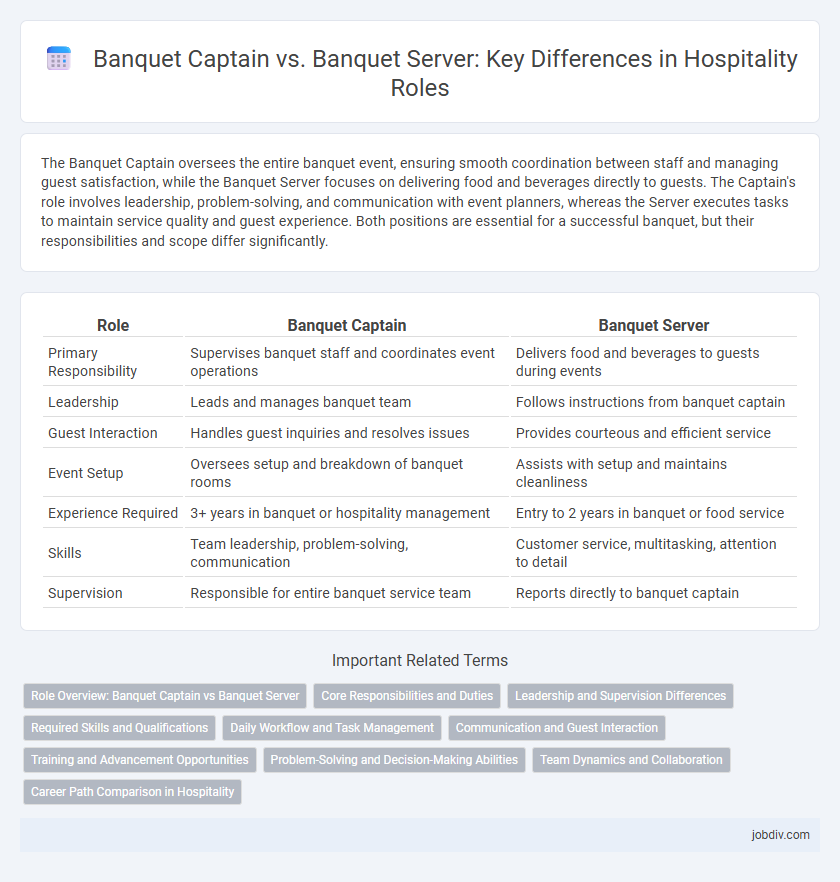The Banquet Captain oversees the entire banquet event, ensuring smooth coordination between staff and managing guest satisfaction, while the Banquet Server focuses on delivering food and beverages directly to guests. The Captain's role involves leadership, problem-solving, and communication with event planners, whereas the Server executes tasks to maintain service quality and guest experience. Both positions are essential for a successful banquet, but their responsibilities and scope differ significantly.
Table of Comparison
| Role | Banquet Captain | Banquet Server |
|---|---|---|
| Primary Responsibility | Supervises banquet staff and coordinates event operations | Delivers food and beverages to guests during events |
| Leadership | Leads and manages banquet team | Follows instructions from banquet captain |
| Guest Interaction | Handles guest inquiries and resolves issues | Provides courteous and efficient service |
| Event Setup | Oversees setup and breakdown of banquet rooms | Assists with setup and maintains cleanliness |
| Experience Required | 3+ years in banquet or hospitality management | Entry to 2 years in banquet or food service |
| Skills | Team leadership, problem-solving, communication | Customer service, multitasking, attention to detail |
| Supervision | Responsible for entire banquet service team | Reports directly to banquet captain |
Role Overview: Banquet Captain vs Banquet Server
Banquet Captains oversee banquet operations, managing staff schedules, coordinating event logistics, and ensuring high-quality service to meet client expectations. Banquet Servers focus on delivering food and beverages, setting up banquet areas, and attending to guest needs during the event. The Banquet Captain holds a supervisory role, while the Banquet Server executes specific service tasks under supervision.
Core Responsibilities and Duties
A Banquet Captain oversees the entire event setup, coordinates staff, and ensures seamless service flow, while a Banquet Server focuses on delivering food and beverages directly to guests according to the event plan. The Banquet Captain manages timing, guest satisfaction, and problem resolution, acting as the main point of contact for event organizers. In contrast, Banquet Servers primarily handle serving tasks, table maintenance, and assistance with guest needs during the event.
Leadership and Supervision Differences
The Banquet Captain oversees the entire banquet event, providing leadership by coordinating staff, managing timelines, and ensuring service quality meets hospitality standards. The Banquet Server focuses on direct guest interaction, delivering food and beverages while following the captain's instructions. Strong supervisory skills distinguish the Captain's role, as they are responsible for staff performance, conflict resolution, and maintaining smooth operations throughout the event.
Required Skills and Qualifications
Banquet Captains require strong leadership, communication, and organizational skills to coordinate large events and manage banquet teams efficiently. Banquet Servers need excellent customer service abilities, attention to detail, and physical stamina to attend guests and handle service equipment. Both roles demand knowledge of food safety standards, event setup procedures, and the ability to work under pressure in fast-paced hospitality environments.
Daily Workflow and Task Management
A Banquet Captain supervises the entire banquet event, coordinating staff assignments, monitoring service quality, and handling guest requests to ensure smooth operation throughout the event. In contrast, a Banquet Server focuses on direct guest interaction, serving food and beverages, clearing tables, and maintaining cleanliness according to the event schedule. The Captain's daily workflow emphasizes leadership and task delegation, while the Server prioritizes efficient execution of specific service tasks under the Captain's direction.
Communication and Guest Interaction
Banquet Captains coordinate communication between event staff and guests, ensuring seamless service flow and prompt issue resolution. Banquet Servers directly interact with guests, providing personalized service and responding to immediate needs at the table. Effective communication from Captains enhances team efficiency, while Servers focus on creating positive guest experiences through attentive interaction.
Training and Advancement Opportunities
Banquet Captains typically undergo extensive training in leadership, event coordination, and team management, paving the way for advancement into supervisory roles within the hospitality industry. Banquet Servers primarily receive training focused on guest service, food and beverage handling, and setup, with opportunities for growth often leading to senior server or assistant captain positions. The structured training programs for Banquet Captains emphasize strategic planning and communication skills that are essential for career progression beyond entry-level service roles.
Problem-Solving and Decision-Making Abilities
Banquet Captains demonstrate advanced problem-solving and decision-making abilities by overseeing event coordination, addressing guest concerns promptly, and managing staff workflows to ensure seamless service. Banquet Servers primarily execute tasks assigned, relying on immediate instructions rather than making autonomous decisions or resolving complex issues during events. Effective banquet management depends on the captain's leadership skills to adapt to dynamic situations and maintain service quality throughout the event.
Team Dynamics and Collaboration
The Banquet Captain oversees team dynamics by coordinating banquet servers and ensuring seamless communication during events, promoting efficiency and high-quality guest service. Banquet Servers execute assigned tasks under the Captain's guidance, fostering collaboration to maintain timing and presentation standards. Effective teamwork between the Banquet Captain and Servers enhances overall event flow and guest satisfaction in hospitality settings.
Career Path Comparison in Hospitality
Banquet Captains oversee event coordination, managing banquet servers and ensuring seamless service, which positions them for leadership roles such as banquet managers or event coordinators. Banquet Servers focus on direct guest service, gaining hands-on experience beneficial for roles like waiter, bartender, or front-of-house supervisor. Career progression from banquet server to banquet captain often involves skill development in team management, communication, and problem-solving within hospitality operations.
Banquet Captain vs Banquet Server Infographic

 jobdiv.com
jobdiv.com